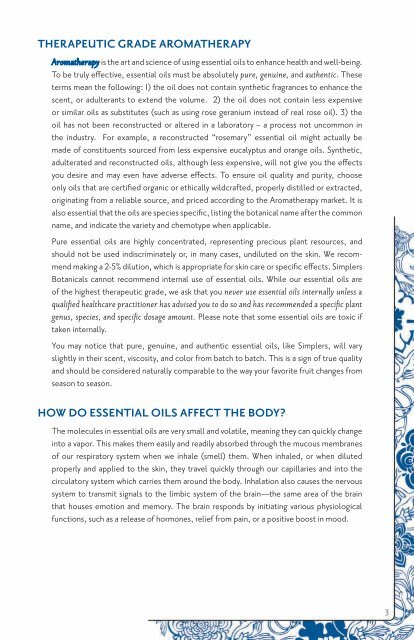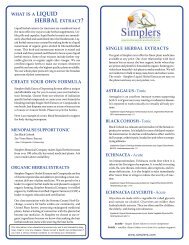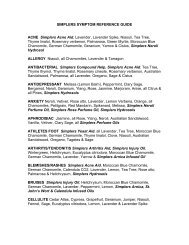Aromatherapy Guide to Essential Oils - Simplers Botanicals
Aromatherapy Guide to Essential Oils - Simplers Botanicals
Aromatherapy Guide to Essential Oils - Simplers Botanicals
You also want an ePaper? Increase the reach of your titles
YUMPU automatically turns print PDFs into web optimized ePapers that Google loves.
thErapEutic GradE aromathErapy<br />
<strong>Aromatherapy</strong> is the art and science of using essential oils <strong>to</strong> enhance health and well-being.<br />
To be truly effective, essential oils must be absolutely pure, genuine, and authentic. These<br />
terms mean the following: 1) the oil does not contain synthetic fragrances <strong>to</strong> enhance the<br />
scent, or adulterants <strong>to</strong> extend the volume. 2) the oil does not contain less expensive<br />
or similar oils as substitutes (such as using rose geranium instead of real rose oil). 3) the<br />
oil has not been reconstructed or altered in a labora<strong>to</strong>ry – a process not uncommon in<br />
the industry. For example, a reconstructed “rosemary” essential oil might actually be<br />
made of constituents sourced from less expensive eucalyptus and orange oils. Synthetic,<br />
adulterated and reconstructed oils, although less expensive, will not give you the effects<br />
you desire and may even have adverse effects. To ensure oil quality and purity, choose<br />
only oils that are certified organic or ethically wildcrafted, properly distilled or extracted,<br />
originating from a reliable source, and priced according <strong>to</strong> the <strong>Aromatherapy</strong> market. It is<br />
also essential that the oils are species specific, listing the botanical name after the common<br />
name, and indicate the variety and chemotype when applicable.<br />
Pure essential oils are highly concentrated, representing precious plant resources, and<br />
should not be used indiscriminately or, in many cases, undiluted on the skin. We recommend<br />
making a 2-5% dilution, which is appropriate for skin care or specific effects. <strong>Simplers</strong><br />
<strong>Botanicals</strong> cannot recommend internal use of essential oils. While our essential oils are<br />
of the highest therapeutic grade, we ask that you never use essential oils internally unless a<br />
qualified healthcare practitioner has advised you <strong>to</strong> do so and has recommended a specific plant<br />
genus, species, and specific dosage amount. Please note that some essential oils are <strong>to</strong>xic if<br />
taken internally.<br />
You may notice that pure, genuine, and authentic essential oils, like <strong>Simplers</strong>, will vary<br />
slightly in their scent, viscosity, and color from batch <strong>to</strong> batch. This is a sign of true quality<br />
and should be considered naturally comparable <strong>to</strong> the way your favorite fruit changes from<br />
season <strong>to</strong> season.<br />
how do EssEntial oils affEct thE Body?<br />
The molecules in essential oils are very small and volatile, meaning they can quickly change<br />
in<strong>to</strong> a vapor. This makes them easily and readily absorbed through the mucous membranes<br />
of our respira<strong>to</strong>ry system when we inhale (smell) them. When inhaled, or when diluted<br />
properly and applied <strong>to</strong> the skin, they travel quickly through our capillaries and in<strong>to</strong> the<br />
circula<strong>to</strong>ry system which carries them around the body. Inhalation also causes the nervous<br />
system <strong>to</strong> transmit signals <strong>to</strong> the limbic system of the brain—the same area of the brain<br />
that houses emotion and memory. The brain responds by initiating various physiological<br />
functions, such as a release of hormones, relief from pain, or a positive boost in mood.<br />
3





